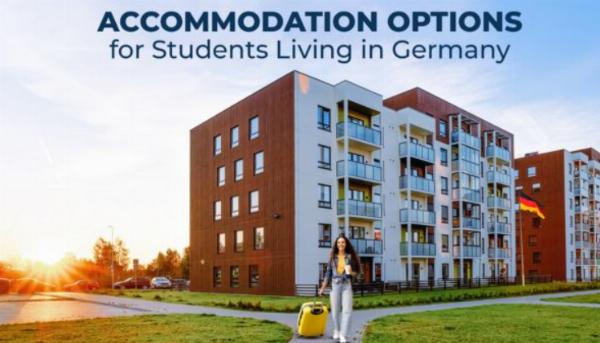Accommodation Options for International Students in Germany: On-Campus and Off-Campus

Strong 8k brings an ultra-HD IPTV experience to your living room and your pocket.
Germany, a land steeped in history, culture, and innovation, attracts international students from across the globe. But amidst the excitement of acceptance letters and study abroad dreams comes the practical matter of finding a place to live. Unlike some countries, German universities typically don't offer extensive on-campus housing. However, fret not, international student! This guide will explore the study in Germany diverse accommodation options available along with overseas consultants, helping you find the perfect fit for your needs and budget.
What are the On-Campus options choices?
While on-campus housing might be scarce in Germany, it's not entirely non-existent. Here are your on-campus possibilities:
Student residences: Managed by student unions ("Studentenwerk"), these residences offer furnished rooms or apartments, often with shared kitchens, bathrooms, and common areas. They're a budget-friendly choice, averaging around €250 per month, and provide a vibrant social environment for meeting fellow students. The downside? Availability can be competitive, so apply early (ideally upon receiving your acceptance letter).
Tips for securing on-campus housing
Contact the Studentenwerk of your university city directly. They manage and allocate residence rooms.
Application deadlines vary, so research well and act promptly.
Some residences offer specific programs or floors for international students.
What are the Off-campus options choices?
The majority of international students find their homes off-campus. Here's a breakdown of the popular options:
Flatshares (Wohngemeinschaft - WG): Sharing an apartment with fellow students (both German and international) is a popular and culturally enriching experience. WGs offer a chance to practice German, learn local customs, and build friendships. Renting a room in a WG typically costs between €300-€450 per month, depending on the city, size of the room, and amenities.
How to find a perfect WG match?
- Online platforms like WG-Gesucht and Facebook groups are excellent resources for browsing WG listings and connecting with potential flatmates.
- Be clear about your preferences (smoking habits, guests, etc.) and budget when reaching out to potential WG mates.
- Consider attending "WG-Castings" – informal meetups where individuals seeking flatmates can introduce themselves.
- Private student apartments: Studios or apartments specifically advertised towards students can be found through online portals like MSM Unify, ImmobilienScout24, and local listings. This option offers more privacy but might be slightly pricier than a WG, with rents ranging from €210-€360 per month depending on location and size.
- Short-term stays: If you're arriving early or haven't secured permanent housing yet, consider hostels, guesthouses, or youth hostels for a temporary stay. This allows you to explore neighborhoods and get a feel for the city before committing to a long-term lease.
Tips for off-campus housing
- Understanding rental agreements: German rental agreements are typically detailed. Familiarize yourself with terms like "Kaltmiete" (cold rent, excluding utilities) and "Warmmiete" (warm rent, including utilities).
- Nebenkosten (additional costs): Be aware of additional costs like heating, electricity, and internet, which might be separate from the base rent.
- Deposits: Landlords often ask for deposits, usually equivalent to 2-3 months' rent. This is typically returned at the end of the tenancy, less any deductions for damages.
Top essential resources
- Here are some handy resources to streamline your accommodation search:
- University international office: Many universities have dedicated international offices that offer housing assistance and guidance to incoming students.
- German student unions: The Studentenwerk website provides valuable information on student residences and the housing market in your city.
- Online forums and communities: Join online forums and social media groups for international students in your city. They can be a great source of advice, tips, and even housing leads.
Finding the perfect place to call home in Germany can be an exciting adventure. By understanding the on-campus and off-campus options, considering your needs, and starting your search early, you'll be well on your way to a comfortable and fulfilling student experience in Germany. Embrace the exploration process, don't be afraid to ask questions, and remember, a great place to live can significantly enhance your overall study abroad journey.
Note: IndiBlogHub features both user-submitted and editorial content. We do not verify third-party contributions. Read our Disclaimer and Privacy Policyfor details.


